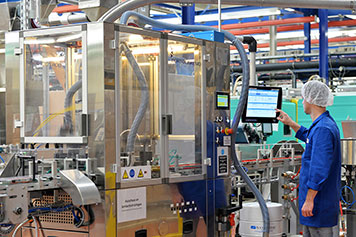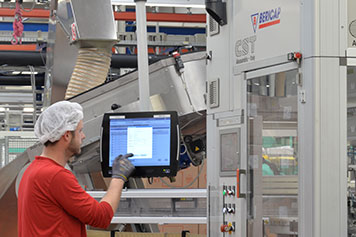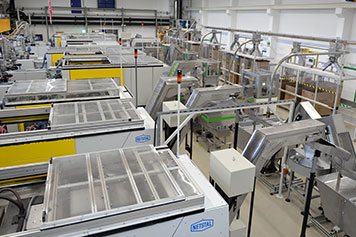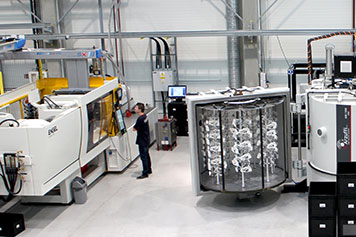BERICAP-group - More transparency and efficiency in complex manufacturing by IGZ

The BERICAP group with annual sales of approximately 800 million Euro, is worldwide among the largest manufacturers of plastic closure caps for the beverage, food and non-food sector. BERICAP's 3,000 employees produce 76 billion closure caps per year. A plastic closure cap is essentially produced in three steps: A precursor of the closure cap is created by injection moulding. In the second part, different components are mounted, for example the sealing washer is inserted into the cap. At the end, the closure cap is printed.
???????Market-oriented production

BERICAP opts for a market-oriented production to respond quickly and flexibly to the requirements of each customer. For this purpose, the group operates 23 production sites in 20 countries and sales offices in more than 70 countries. Although the production is largely automated, many work processes at BERICAP were still based on paper. For instance, the sequence planning of production in SAP ERP order sheets, control and nominal/actual data sheets were created and printed out. Moreover, procedures supplied together with the sheets in the production were also on paper.
This approach was linked with the known disadvantages: Apart from the complicated distribution of individual papers to the machine operators, the effort for a change of order was particularly very high. The corresponding sheets had to be created anew, printed and again distributed. This leads to delays in production and some avoidable errors.
Disadvantages of a paper-oriented manufacturing

This paper-oriented manufacturing meant also that BERICAP did not have real time information about the respective production progress on the machines. Employees had to repeatedly manually collect and enter the appropriate information in SAP ERP in certain cycles on all machines. This delayed reporting obstructed quick reactions in the production. As such, there was still no other option to appreciate than the downtime on the machines. Micro disturbances with a duration of less than 60 seconds were so far not recorded at BERICAP. Also, the detection of disturbances was not standardised overall. Each machine operator brought his own systematic in the collection of data and thus impeded the formation of meaningful and comparable indicators.
The fact that information about the manufacturing states were transmitted and evaluated only with delay meant that BERICAP could react only with delay. This makes it difficult for planning scarce resources. On the other hand, it comes to unnecessarily long machine downtimes or costly overproduction. "Online transparency of the situation in the production was missing", Volker Brummer, Manager IT group coordination at BERICAP brings it to the point. "We had no way of real-time visualisation, for example about the current status of the machine." Moreover, the quality demands of customers rise, driving the requirements for the traceability of products in manufacturing. Here, too, the company saw the need for optimisation. "A relevant documentation without system support would be possible only with disproportionately high costs", said the head of IT at BERICAP.
The appropriate MES solution

To increase both transparency and efficiency in production, BERICAP opted for the introduction of an MES solution. Thereby, BERICAP tested also MES systems providers machine suppliers and special industry solutions for the injection moulding industry. Due to the heterogeneous machine park, a system solution of a single machine manufacturer did not come in question for the company. MES for the injection moulding industry was not an option for BERICAP due to the low integration to SAP ERP and the typical MES solutions from SAP ERP oriented third-party suppliers could not afford an ERP independent production.
The company therefore chose SAP MII, a standard MES solution from SAP and with IGZ the leading SAP project house they teamed up with a production professional implementation partner. "The SAP know-how and the high level of knowledge and experience in the integration of machines have convinced us at IGZ", explained Brummer. The production plant at the company's headquarters in Budenheim near Mainz was selected as a pilot site. "In Budenheim we have a fairly complex production for special closures. Moreover, the colleagues have worked there for 20 years with SAP", says IT CEO Brummer. "Their motivation to introduce an MES is correspondingly high."
???????Pilot project with 30 machines
In the first phase of the pilot project, about 30 machines were first integrated in Budenheim. Later, all production plants shall follow. Each machine was connected directly to SAP MII and received an SAP MII control panel through which the information related to the respective order are available to the machine operator, and on the other hand, other information about standstills, interferences, etc. are recorded. An SAP MII hall display was introduced, through which the state and the production progress for each connected machine are represented graphically. Furthermore, the integration in SAP ERP took place for the transfer of master data and production orders, as well as online order confirmations. This enables BERICAP to dispense with the printing and distribution of orders, control and target/actual data sheets and operating procedures.
"With the introduction of SAP MII and the support of IGZ, we are a significant step closer to paperless production", sums up Brummer. The objective of transparent production was achieved through online visualisation of job progress and the status of the machine. Thus, BERICAP now constantly has current information on each production order at disposal, so that the company can respond faster and more flexibly. In addition, BERICAP could optimise the traceability.
Prepared for the future

In the second phase of the project, the company wants to optimise the equipping processes of the machines based on available actual data, since by SAP MII BERICAP is now able to foresee the production end of an order. Also, the reporting is based now on valid data, thanks to SAP MII. Hereby, different indicators (e.g. plant availability (OEE), throughput, cycle time, etc.) can be analysed. For the long-term evaluations and comparisons of indicators across different locations, the export of data to SAP BW is intended. For the SAP MII OEE indicators and the data acquisitions of production-relevant data necessary for this, BERICAP consistently opts for the Weihenstephan standard.
In a further phase, BERICAP with IGZ together want to bring also current production accompanying information such as machine parameters, error patterns or process and test instructions directly to the machine in addition to the current production order information. The acquisition of quality audits shall take place directly in the production, system supported. BERICAP has created the basis for this with the introduction of SAP MII. "And certainly, we have not even exhausted the potential," says IT manager Brummer, who thus considers his company well positioned for the future.
Back to overview

